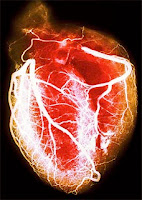 I want to share with you a personal story about my health, which I think will be a great illustration of the conundrum facing the modern medical paradigm.
I want to share with you a personal story about my health, which I think will be a great illustration of the conundrum facing the modern medical paradigm.
I just got my annual physical results from my doctor. He told me that my numbers all came back perfect. All except one: You have high cholesterol. Yawn. OK, how high. 270. This is high despite your HDL being pretty high also. And your LDLs, which are your bad cholesterol are 181. In the absence of other factors–like you are not 40 lbs overweight, and your blood pressure is good, and you don’t smoke–it probably won’t go down with diet and exercise alone, so…you’ll probably want to get that treated.
And my HDLs are at what number? 89.
And my total/HDL ratio? Oh…hmmm….well, that’s actually pretty good. It’s 3.1.
For those who don’t know, HDLs are “good” cholesterol; they remove the so-called “bad” cholesterol (don’t know how a substance produced by the body, and needed to break down and digest fats can be considered bad, but, whatever). HDLs in the 40 range are considered “normal”. 89, might I say, is outstanding…thank you very much.
The total cholesterol to HDL ratio is a good determinant of the risk for cardiovascular disease. Just for a little perspective, 5.0 is “average” risk. Anything under 3.4 is “very low” risk. I’m 3.1.
Here’s the problem: My caring doctor–bless his heart–knows damn well that I’m at a low risk for cardiovascular disease. I’m 41-years-old and in the best shape of my life. I’m 155 lbs, have stellar blood pressure (120/70), don’t smoke, don’t drink, don’t do drugs; I’m on no medications; I do not partake in risky behavior. Why the bleep is he recommending treatment* (which is prophylactic statin medication, if you didn’t know)?
 I’ll tell you why–for liabilities sake. He knows that if he doesn’t tell me that I have high cholesterol, and he doesn’t recommend “treatment” (frickin’ treatment, lol), and I drop dead of a heart attack, even if it’s because I snort a gram and a half of cocaine! he’s liable. That’s right–tort litigation! Just ask Billy Mays’ doctor. Coroners found cocaine in his system; but nooo, his family insists it was high blood pressure that killed him. Not saying that they are seeking damages; but it’s the potential I’m talking about. Every doctor is afraid of being sued. Medical malpractice insurance is one of the highest costs facing doctors today. So what do they do to keep their premiums down? Order every frickin’ test humanly possible. Cha-ching.
I’ll tell you why–for liabilities sake. He knows that if he doesn’t tell me that I have high cholesterol, and he doesn’t recommend “treatment” (frickin’ treatment, lol), and I drop dead of a heart attack, even if it’s because I snort a gram and a half of cocaine! he’s liable. That’s right–tort litigation! Just ask Billy Mays’ doctor. Coroners found cocaine in his system; but nooo, his family insists it was high blood pressure that killed him. Not saying that they are seeking damages; but it’s the potential I’m talking about. Every doctor is afraid of being sued. Medical malpractice insurance is one of the highest costs facing doctors today. So what do they do to keep their premiums down? Order every frickin’ test humanly possible. Cha-ching.
And they “treat” 41-year-old males in great health with statins, otherwise known as, “the best selling drugs of all time.“
It’s not doctor greed, I tell you–it’s attorney greed. And public ignorance. There I’ve said it. Nobody is talking about that part of the health care crisis.
*Just so you know: I’m not taking them.










